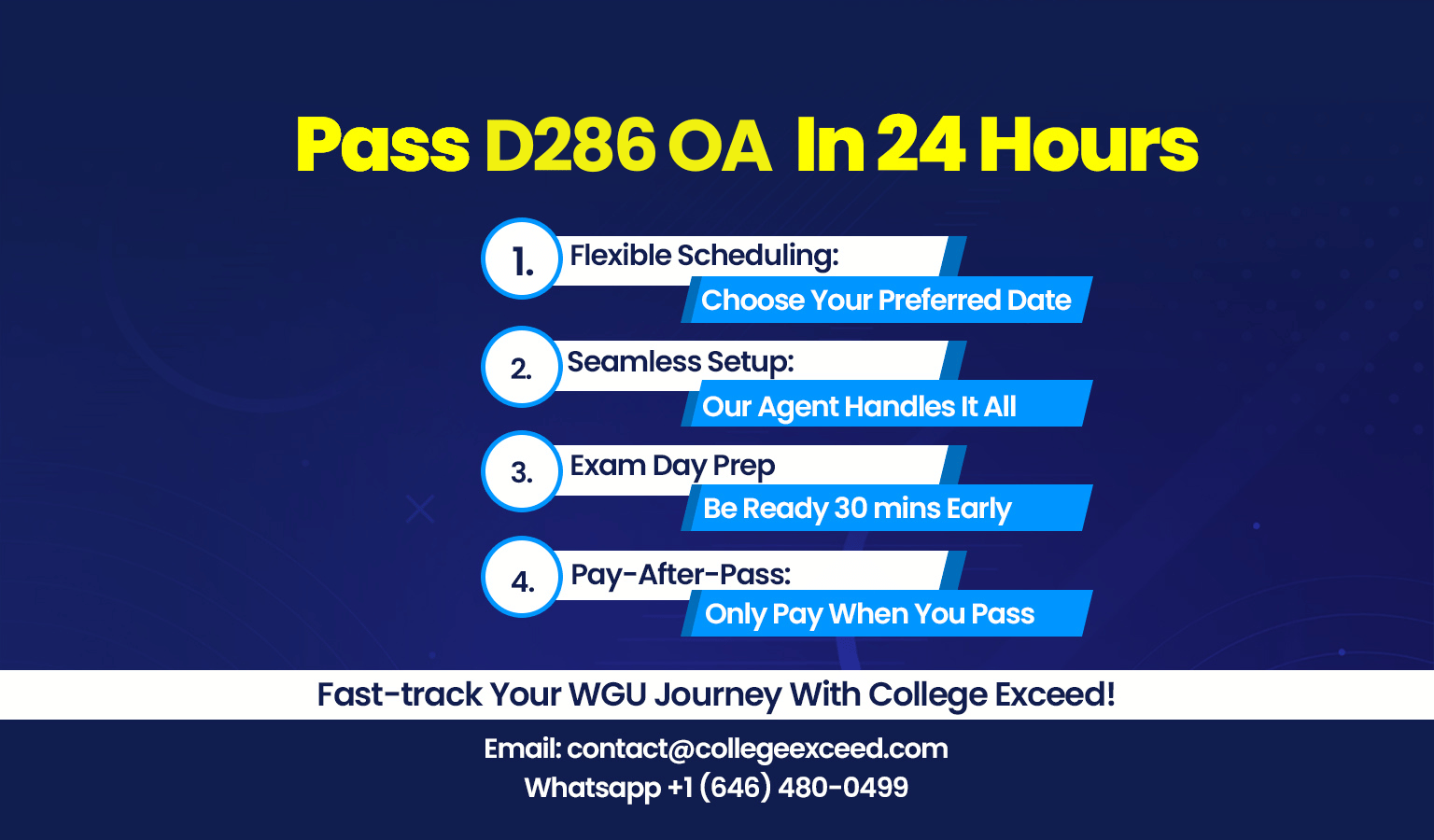Well, here is your one-stop resource to be your guide for your Java Fundamentals D286 at WGU. If you are feeling a bit daunted about this course, don’t worry, you are not alone. Let me state that everything in this article has been meant to demystify this class so that you can excel in it. If you’re Java inexperienced or searching for a manual that will quickly assist you, you’re in the proper place.
In this article, we will dive deep into the following subtopics:
- What to Expect from the Module: Learn about the key concepts covered in this course and what areas you need to focus on.
- Study Guide to Pass the OA: A week-by-week study plan to help you prepare effectively for the Objective Assessment (OA).
- External Resources to Help You Study: Discover free resources that can aid your understanding of difficult concepts.
- Key Topics to Focus On: We’ll simplify complex topics using comparisons, tables, and real-world examples.
- Conclusion: A quick wrap-up to get you ready to start your learning journey.
Ready to dive in? Let’s get started on the path to success in Java Fundamentals D286!
...
An Overview of Java Fundamentals WGU D286 : What to Expect 📖
The Java Fundamentals D286 course is a detailed course on dynamic data structures and the working algorithms for these structures. This course is aimed at both absolute beginners in programming, and those who already have some experience, as it explains the principles of the arrangement and access to data in the context of the Java programming language. Here’s what you can expect to learn:
- Dynamic Data Structures: There you will explore the concepts of dynamic data structures such as bags, list, stack, queue, trees, and hash tables. Knowledge of these structures is necessary as they represent the foundation on which good software can be built. You will be also shown how you can employ and incorporate these structures to provide a solution to complex problems that you are likely to encounter in your OA (Objective Assessment).
- Object-Oriented Design: A crucial aspect of the course is the usage of the object-oriented programming paradigm and the abstract data types as the base concepts of the software architecture. Of course, to pass the course it is necessary to understand the basics of OOP. Nevertheless, further investigation of these concepts will help to succeed if you are aiming at the broader Java track. You will be enlightened on how to use encapsulation as well as inherited classes and polymorphism when designing effective and easy-to-maintain applications.
- Problem-Solving Techniques: This course is based on problem-solving. It covers various approaches to the design of the software you are to develop so that in addition to making the right design, it is effective as well as easy to maintain. The course also comprises simple applications and by doing those, some concrete application of the learned subject matter is bound to occur, thus helping to cement one’s learning of those concepts.
To pass this course, there are specific skills and knowledge areas you’ll need to master:
- Creating Loops: Understanding how to create loops is essential for managing repetitive tasks in your code. You’ll work with different types of loops, such as for, while, and do-while, to iterate over data structures or perform repeated actions efficiently.
- String Manipulation: Knowing how to manipulate strings is crucial. You’ll practice slicing, concatenating, and modifying strings, along with ensuring that you can print values with or without whitespace as required by the task—this is very important for passing your assessments.
- Printing Values and New Lines: In programming, output formatting is key. Make sure you’re comfortable printing values and adding new lines after statements when needed, especially when questions explicitly ask for it.
- Object-Oriented Programming (OOP): It is not necessary to cram about OOP to be able to pass although it is important to be familiar with the basics. Exposed to the theory of getter/setter methods, object instance creation/usage, and simple inheritance.
- Arrays and ArrayLists: Understand how to make arrays and ArrayLists and also how to control them. These are basic for preserving accumulated data, and you will need to understand what circumstances call for the usage of one in preference to the other.
- Counting with Variables: Being able to create and manage variables for counting purposes is vital. This skill will help you manage loops, track iterations, and handle user input.
- User Input: Essential aspects of your assessments include the approaches you currently have to get input from a specific user and process it in the application.
- Random Number Generation: You will also need to know how to generate a random number, something that can be critical when generating sample or testing outputs.
If you concentrate on these areas and use the problem-solving approach that is taught in this course you are well on your way to passing Java Fundamentals D286 with ease.
The Ultimate Study Guide to Navigate the Course Content📝
Passing the Java Fundamentals D286 course requires a structured approach to studying, and I’ve laid out a week-by-week guide to help you do just that. By following this plan, you’ll build your understanding step by step, ensuring you’re well-prepared for the Objective Assessment (OA) by the end of the course.
Week 1: Read the Zybook (Textbook)
- Objective: Familiarize yourself with the fundamental concepts of Java and dynamic data structures.
- Action Steps:
- Start by reading through the Zybook chapters, focusing on the basics of dynamic data structures like lists, stacks, queues, and trees. Make sure to understand the examples provided, as they will be the foundation for the tasks you’ll need to complete later.
- Take notes on key concepts such as object-oriented design, loops, and string manipulation, as these will be crucial in your assessments.
- Engage with the interactive elements in the Zybook to reinforce your learning. These activities are designed to help you grasp complex ideas in a more practical way.
Week 2: Complete the Practice Test in the Last Chapter of the Zybook
- Objective: Assess your understanding and identify areas where you need improvement.
- Action Steps:
- After completing the Zybook reading, attempt the practice test provided in the last chapter. This test will give you a good sense of what to expect in the OA.
- Focus on questions related to loops, string manipulation, and object-oriented programming. These topics are often heavily tested.
- Review any questions you get wrong and revisit the corresponding Zybook sections to solidify your understanding. This practice test is crucial for identifying your strengths and weaknesses.
Week 3: (Optional) Complete the Oracle Java Foundations Course
- Objective: Deepen your understanding of Java fundamentals and reinforce your learning with additional resources.
- Action Steps:
- If you have the time and desire to further solidify your understanding, consider completing the Oracle Java Foundations Course. The course provides a more in-depth look at Java, covering key concepts that will be beneficial, especially if you plan to continue with Java in future courses.
- You can find the link to this course in the External Resources section of this article. While it’s optional, it can provide additional practice and insights that may not be covered in the Zybook.
Week 4: Do the Pre-A
- Objective: Test your readiness for the OA by simulating the exam environment.
- Action Steps:
- Attempt the Pre-A assessment, which is designed to mimic the structure and difficulty of the OA. This practice test will help you gauge how well you’ve understood the material and where you might need more practice.
- Focus on achieving a score of 85% or higher. If you fall short, review the areas where you struggled and retake the Pre-A until you consistently score above 85%. This will ensure that you’re thoroughly prepared for the real exam.
Week 5: Do the OA
- Objective: Successfully complete the Objective Assessment and pass the course.
- Action Steps:
- With all your preparation in place, you’re now ready to tackle the OA. Approach the exam with confidence, knowing that you’ve reviewed the material thoroughly and practiced extensively.
- During the exam, pay close attention to the instructions, especially when it comes to output formatting (e.g., printing values with or without whitespace). These details can make a significant difference in your score.
- After completing the OA, take a moment to reflect on your learning journey. Whether you pass on your first attempt or need another try, you’ve gained valuable skills that will serve you well in your future studies.
By following this week-by-week study plan, you’ll build a solid understanding of the material and be well-prepared to pass the Java Fundamentals D286 course. Consistency and practice are key, so stay focused and keep progressing through the steps.
...
Tips and Tricks to Prepare for the D286 OA 📂
Passing the Objective Assessment (OA) in the Java Fundamentals D286 course requires more than just understanding the material—you need to be strategic in your preparation. Here are some essential tips and tricks to help you succeed:
- Master the Random Number Generation with Doubles
- Why It’s Important: While random number generation is a common concept, using it with doubles isn’t covered in the Zybook. Make sure you take the time to understand how random works with double values, as this could be a crucial part of your assessment.
- How to Prepare: Practice writing code that generates random double values and performs calculations with them. Familiarize yourself with the syntax and common pitfalls.
- Be Aware of Exam Typos
- Why It’s Important: The OA, like the Pre-A, may have typos or inconsistencies between the instructions and the TODO comments inside the coding window. These can be confusing if you’re not prepared.
- How to Prepare: During your practice, especially with the Pre-A, pay close attention to any inconsistencies. Train yourself to read instructions carefully and compare them with the code comments to avoid being misled during the exam.
- The Pre-A and OA are Very Similar
- Why It’s Important: The Pre-A (Pre-Assessment) is a strong indicator of what you’ll encounter in the OA. The questions, structure, and difficulty level are closely aligned.
- How to Prepare: At this time, take the Pre-A times as many as you wish until you get a result that is satisfying. It is especially useful as a means of getting yourself acquainted with the kind of questions that you are likely to encounter in the OA. The aim is not to produce parrot-like answers but to pay heed to the instructions.
- Complete at Least 50% of the Labs (Units 1-8)
- Why It’s Important: The labs are expected to have content that supports the information that is contained in the course. If one is to be part of the OA becoming familiar with the content through the labs is important, thus doing at least 50% of them.
- How to Prepare: Concerning the laboratories, concentrate on units 1-8, and try to achieve at least three laboratories for each unit. Doing this will assist you in cementing your knowledge on matters such as arrays, loops, and strings among others.
- Memorize Key Concepts and Syntax
- Why It’s Important: Certain concepts and syntax are frequently tested in the PA and OA. Memorizing them will save you time and reduce the chance of errors during the exam.
- How to Prepare: Focus on the following areas:
- Arrays and ArrayLists: Know how to declare, initialize, and manipulate these data structures.
- Setters and Getters: Understand how to create and use these methods to access and modify object properties.
- Loops (for and while): Be comfortable with both for loops and while loops, particularly in scenarios involving user input and array manipulation.
- Scanner with User Input: Practice using the Scanner class to capture and process user input, a common task in Java programs.
- Constructors: Make sure you understand how to use constructors and overloaded constructors to initialize objects.
- String Manipulation: Be proficient in methods like substring(), indexOf(), and replace().
- Finding Max Value: Learn how to write code that finds the maximum value from a set of user inputs.
- Using and Calling Methods: Ensure you’re comfortable defining and invoking methods, particularly in the context of solving problems presented in the exam.
- Revisit Zybooks and Supplemental Sources
- Why It’s Important: As you work through the labs and challenging activities, you may identify areas where you’re not as strong. Revisiting these topics will help reinforce your knowledge.
- How to Prepare: Use your Zybooks and any supplemental resources to review weak areas. Focus on understanding the “why” behind each concept, not just the “how.”
- Understand and Utilize the Pre-A Concepts
- Why It’s Important: The concepts covered in the Pre-A are directly applicable to the OA. Understanding why you’re using a particular approach to solve a problem is key to applying that knowledge in different scenarios.
- How to Prepare: As you work through the Pre-A, take the time to analyze each question. Ask yourself why a particular solution works, and ensure you can explain it in your own words. This deep understanding will serve you well in the OA.
- Take the Pre-A Over and Over
- Why It’s Important: Revision is also another way of consolidating knowledge. The multiple takes on the Pre-A will make you quite familiar with the kind and nature of questions, as well as the general format of the exam.
- How to Prepare: To do this, keep attempting the Pre-A until you make 85 percent and above on average. Every time you take it, go through the answers and comprehend why and how the answer was identified to be right or wrong.
Here are some tips and tricks that the reader can use to prepare him or her for the OA: As a reminder, the students need to know that memorization for the sake of it will not be very helpful; instead, the concepts need to be understood and then be put to practice.
...
External Resources to Study👨🏻🏫
Oracle Java Foundations Course
- ∙ Link: Oracle Java Foundations Course
- Why: A comprehensive, free course from Oracle covering essential Java concepts. Great for building a strong foundation.
Udemy Course: Learn Java Programming
- ∙ Link: Udemy Course – Learn Java Programming
- Why: A detailed course for those seeking additional practice and insights into Java fundamentals.
W3Schools Java Tutorial
- ∙ Link: W3schools – Java
- Why: A beginner-friendly guide with interactive examples. Perfect for quick references and understanding core concepts.
Complete the Java Course on YouTube
- ∙ Link: Complete Java Course on YouTube
- Why: A full video course covering Java basics to advanced topics. Ideal for visual learners.
Quizlet Flashcards
...
Conclusion: Building Your Java Skills📄
You’ve now got a comprehensive roadmap to ace the Java Fundamentals D286 course at WGU. By following the week-by-week study plan, leveraging external resources, and focusing on key concepts, you’re setting yourself up for success. Remember, consistency is key—keep practicing, revisiting difficult topics, and testing yourself with the Pre-A until you’re confident. With the right preparation, you’ll not only pass the OA but also build a solid foundation in Java that will benefit you in future courses. Good luck, and happy coding!






